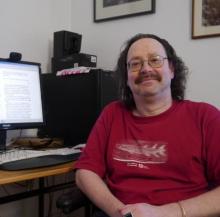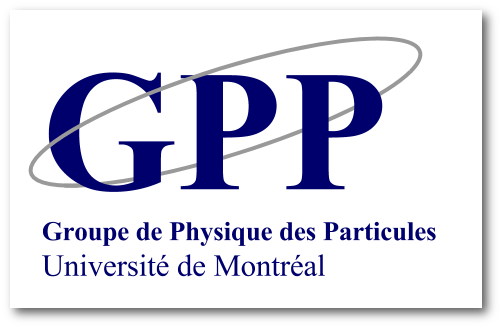You are here
Prof. David London Awarded 2014 CAP-TRIUMF Vogt Medal for Contributions to Subatomic Physics

The Canadian Association of Physicists (CAP) and TRIUMF are pleased to announce that the 2014 CAP-TRIUMF Vogt Medal for Contributions to Subatomic Physics is awarded to Prof. David London, Universite de Montreal, for his seminal contributions to theoretical physics especially in the field B physics.
The Standard Model (SM) of particle physics is the theory that describes all the fundamental particles of nature, as well as most of the forces with which they interact. It has yielded hundreds of predictions, almost all of which have been veried. There is little doubt that the SM is correct. Nevertheless, for a variety of reasons, most particle physicists do not believe it is complete - there must exist new particles and new phenomena not described by the SM. The search for this "new physics" is the driving force behind most research in particle physics today, both theoretical and experimental. David London is a world-reknowned particle theorist. He is best known for his work in B physics. The B-factories BaBar (SLAC, California) and Belle (Japan) were built in the 1990's, and took data for over a decade until 2008 (BaBar) and 2010 (Belle). Their goal was to study the properties of B mesons, in particular to test the SM explanation of CP violation. (CP is the symmetry which relates matter and antimatter.) If this explanation were insufficient, it would be a clear sign of new physics. Dr. London was very active in this endeavour { many of the principal measurements made at the B-factories were done using techniques proposed by him and his collaborators. Although some hints of disagreements with the SM were observed, nothing conclusive has yet been established. Dr. London has also studied a variety of specific possibilities for the new physics. On the one hand, he has used experimental results to put constraints on new-physics models. On the other hand, he has described the new-physics signals which can be seen at future colliders. It is for this pursuit of physics beyond the SM that David is awarded the CAP-TRIUMF Vogt Medal.
The purpose of the Vogt Medal is to recognize and encourage outstanding experimental or theoretical contributions to subatomic physics. While the main criterion for awarding the Vogt Medal is the excellence of the research accomplishments, preference will be given for a recent important advance in subatomic physics and to researchers who are still active. The candidate's research should have been done primarily in Canada or in affiliation with a Canadian university, industry or government laboratory. The Vogt Medal was first introduced in 2011.
Prof. David London will be presented with the 2014 CAP-TRIUMF Vogt Medal for Contributions to Subatomic Physics at the 2014 CAP Congress (hosted by Laurentian University in Sudbury, Ontario, from June 16-20) at the end of his plenary talk (via web conferencing) and will be recognized during the Congress banquet to be held on Thursday, June 19, 2014. Please refer to the Congress program for the schedule of plenary talks by CAP medal winners.
The Canadian Association of Physicists, founded in 1945, is a professional association representing over 1600 individual physicists and physics students in Canada, the U.S. and overseas, as well as a number of Corporate, Institutional, and Departmental Members. In addition to its learned activities, the CAP also undertakes a number of activities intended to encourage students to pursue a career in physics.
TRIUMF is one of the world’s leading subatomic physics laboratories. It brings together dedicated physicists and interdisciplinary talent, sophisticated technical resources, and commercial partners in a way that has established the laboratory as a global model of success. Its large user community is composed of international teams of scientists, post-doctoral fellows, and graduate and undergraduate students. The advances ensuing from TRIUMF’s research will enhance the health and quality of life of millions of Canadians, launch new high-tech companies, create new high specificity drugs, help us to understand the environment, enable the development of new materials, and spur the imaginations of our children who want to know their place in the universe.
For more information, please contact:
Canadian Association of Physicists
Tel: (613) 562-5614
Fax: (613) 562-5615
E-mail: cap@uottawa.ca
or
Tim Meyer
Head of Strategic Planning and Communication
TRUMF
Tel: (604) 222-7674
E-mail: tmeyer@triumf.ca

